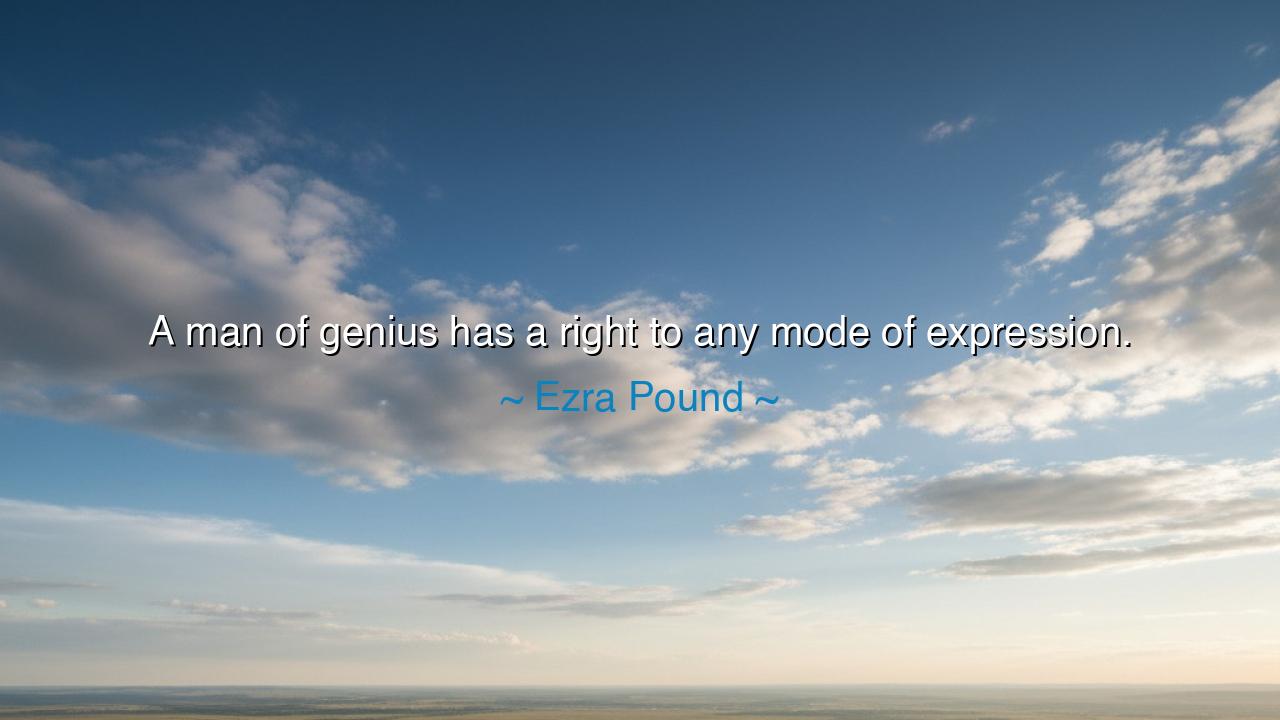
A man of genius has a right to any mode of expression.






In the tempestuous age of modern art and awakening, Ezra Pound, poet, visionary, and provocateur, declared with the fire of conviction: “A man of genius has a right to any mode of expression.” These words, like a thunderclap, speak of freedom — not the careless freedom of whim, but the sacred right of the creator to shape truth as his spirit demands. To Pound, the genius is not a servant of tradition; he is its liberator. He dares to break form so that new forms may live. His words are a call to courage for every soul who has ever felt the pulse of creation and feared the judgment of the world.
The origin of this quote can be traced to Pound’s rebellion against convention in the early twentieth century — an age of revolution in art, thought, and language. He stood among those who shattered the rigid molds of the Victorian past, forging the raw, daring vision of modernism. Through poetry, painting, and philosophy, artists of his time sought to express the chaotic truth of a changing world — not with politeness, but with passion. Pound’s declaration was not arrogance, but defense — a defense of the right of the artist to speak in whatever language the soul requires, whether it be soft as a whisper or sharp as shattered glass.
To say that a man of genius has the right to any mode of expression is to affirm that creativity transcends boundaries. The true artist is not bound by the rules of grammar, society, or taste, for his work springs from a deeper order — the order of insight. The laws that constrain ordinary minds cannot bind the one who sees beyond. Genius is the flame that consumes limitation, the storm that shakes the tree so that new fruit may grow. Those who judge genius by convention misunderstand it entirely. The artist does not imitate life; he recreates it.
History gives us many examples of this sacred defiance. Consider Vincent van Gogh, who painted with the ferocity of emotion rather than the precision of realism. His swirling skies and blazing suns were once mocked as madness. Yet he saw what others could not — the living energy within all things. He chose his own mode of expression, and though the world rejected him in his lifetime, his vision became immortal. Or think of Ludwig van Beethoven, who, deaf and tormented, broke the forms of classical music to birth the symphony of the future. His genius refused to obey. He expressed not what was expected, but what was true.
In these souls we see the essence of Pound’s wisdom: that genius has its own law. To deny a creator his freedom of expression is to chain the very spirit that advances humanity. Yet this freedom is not a license for vanity — it is a sacred trust. For genius, when pure, does not seek to shock or destroy, but to reveal. Its purpose is revelation, not rebellion for rebellion’s sake. The mode of expression — whether bold or gentle, simple or complex — must arise from the necessity of truth, not the desire for attention.
But there is a warning in these words as well. For while the right to expression belongs to the genius, it demands from him responsibility. Power without purpose leads only to noise. The great artist must master his gift, shaping chaos into order, emotion into art. Freedom without discipline becomes waste; expression without integrity becomes arrogance. The true creator is both wild and wise — free in spirit, but governed by the law of honesty to his vision.
So, my children of thought and flame, learn from Ezra Pound this eternal lesson: if you feel within you the fire of creation, do not let fear or conformity extinguish it. Speak in your own voice. Write, paint, build, sing — not as others tell you, but as your soul commands. Yet remember that genius is not measured by defiance alone, but by truth — by how faithfully your art serves the deeper reality that calls through you.
For every age needs its bold spirits — those who dare to speak the unspeakable, who challenge the silence of complacency. A man of genius has a right to any mode of expression, but that right is sanctified only when it is used to reveal what words alone cannot say. Therefore, let your expression be your offering — fearless, original, and alive — a bridge between what is and what might yet be. For in that act of courage, you join the lineage of those who have shaped the destiny of humankind through the power of a single, unbounded voice.






AAdministratorAdministrator
Welcome, honored guests. Please leave a comment, we will respond soon